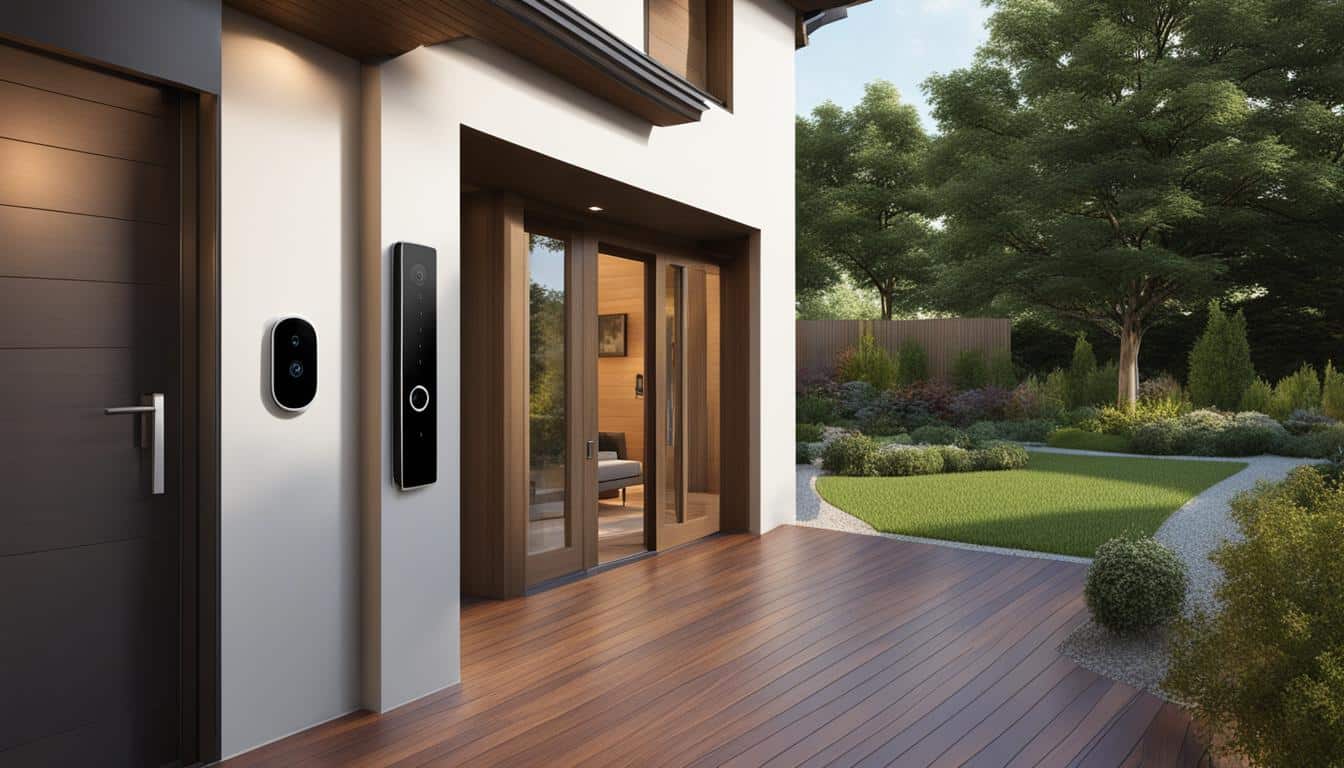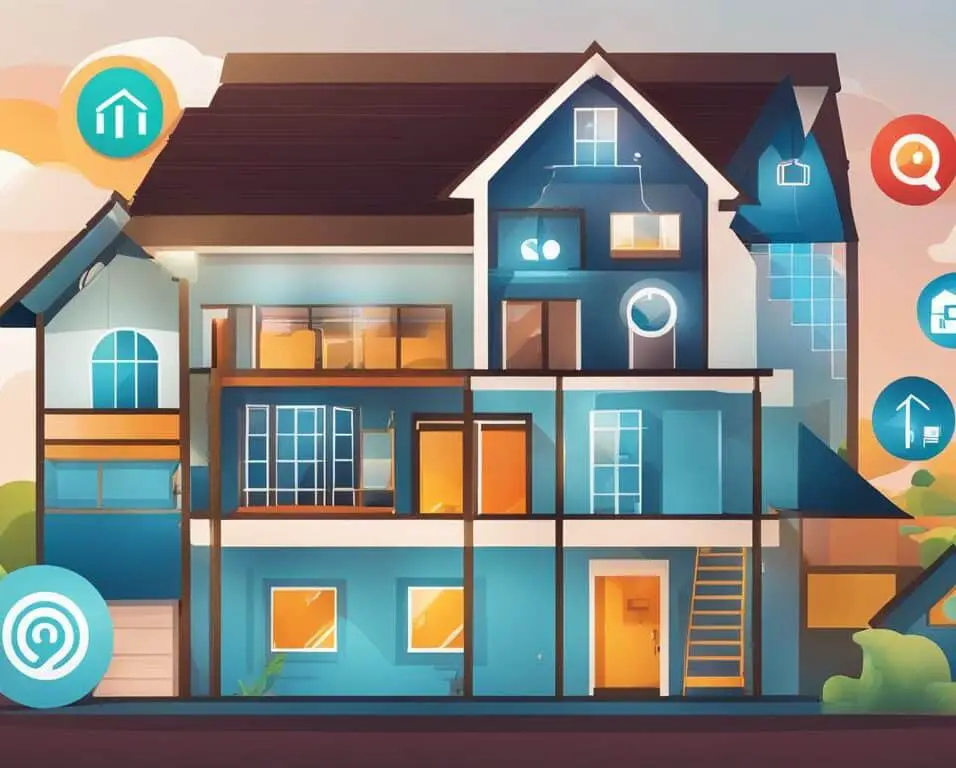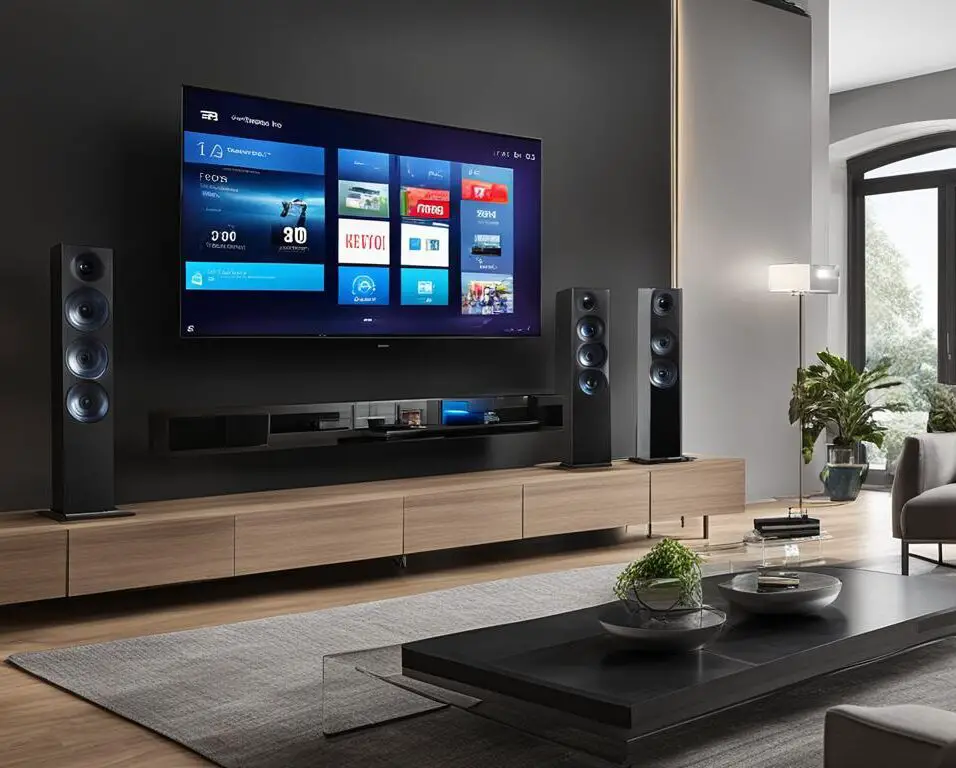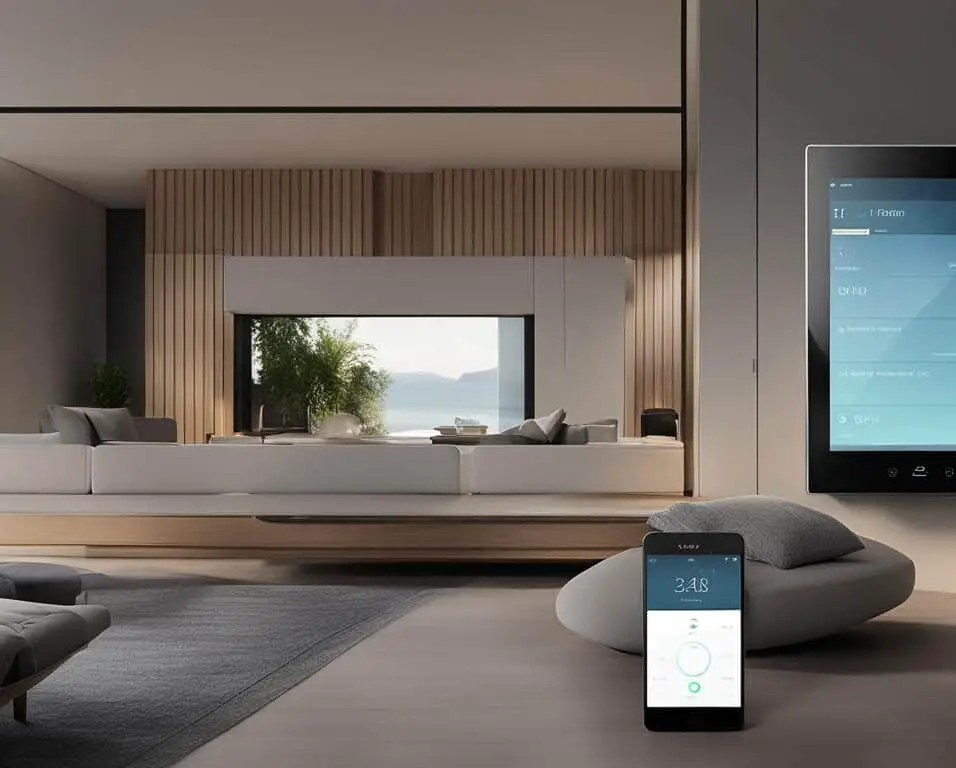Smart Locks and Home Security: What You Need to Know
Welcome to an informative guide on smart locks and how they can enhance your home security. In today’s digital age, secure home access is of utmost importance, and smart locks provide an innovative solution. With their advanced features, smart locks not only offer convenience but also improved residential security.
Smart locks revolutionize the way we protect our homes by allowing us to lock and unlock our doors from anywhere in the world using an app and an internet connection. These locks offer the same safety features as traditional locks, such as required logins, encryption, and authentication. Additionally, they provide added protection against unauthorized access with features like alerts for unexpected door openings.
To ensure optimal security, it is crucial to set up a secure home Wi-Fi network and follow online security measures. By choosing smart locks from trustworthy manufacturers, using strong passwords, and regularly updating the lock’s software, you can minimize the risk of hacking.
Smart locks offer numerous advantages over traditional locks. They eliminate the need for physical keys, allowing you to control access through unique codes. Additionally, they provide the convenience of receiving notifications of door activity and managing guest access. However, it’s important to consider potential drawbacks, such as the need for battery replacements and software updates, as well as a learning curve for those unfamiliar with technology.
By understanding the types of smart locks available and how they work, you can make an informed decision for your home security needs. From wireless smart locks to keyless entry systems and digital door locks, there are options to suit various preferences and requirements.
In conclusion, smart locks offer a convenient and secure solution for home access. With their keyless entry, auto-locking features, guest access management, and activity logs, you can enhance security while enjoying the convenience of modern technology. When implemented correctly and coupled with online security practices, smart locks provide peace of mind and improved residential security.
Key Takeaways:
- Smart locks allow remote control of your doors using an app and an internet connection.
- Setting up a secure home Wi-Fi network is crucial for the safety of smart locks.
- Choose smart locks from trustworthy manufacturers and keep the lock’s software up to date to minimize the risk of hacking.
- Smart locks provide advantages such as eliminating the need for physical keys and controlling access through unique codes.
- Consider the type of smart lock that suits your needs, such as wireless smart locks, keyless entry systems, or digital door locks.
Types of Smart Locks and How They Work
When it comes to securing your home with smart technology, there are various types of smart locks to choose from. These innovative devices offer convenience, improved security, and seamless integration with other smart home devices. Let’s explore the different types of smart locks and how they work.
Wireless Smart Locks
Wireless smart locks utilize Wi-Fi or Bluetooth technology to connect to your smartphone, allowing you to control and monitor your lock from anywhere. With a wireless smart lock, you can lock and unlock your door remotely, grant access to visitors, and receive real-time notifications of door activity. These locks offer convenience and peace of mind, as you can always ensure your home is securely locked, even when you’re not there.
Keyless Entry Systems
Keyless entry systems eliminate the need for a traditional key. Instead, they offer alternative methods of access, such as fingerprint scanners, keypads, or smartphone apps. These systems provide enhanced security, as there are no physical keys that can be lost or stolen. Additionally, keyless entry systems often come with advanced features like time-limited access codes, allowing you to grant temporary access to guests or service providers.
Digital Door Locks
Digital door locks replace the traditional deadbolt on your door and can be synced with your smartphone via Bluetooth or Wi-Fi. These locks offer keyless entry using your smartphone as a virtual key. Digital door locks are known for their sleek design and easy installation. They provide a high level of security by utilizing advanced encryption and authentication technologies.
| Type of Smart Lock | Key Features |
|---|---|
| Wireless Smart Locks | Remote control, real-time notifications, guest access management |
| Keyless Entry Systems | Fingerprint scanners, keypads, time-limited access codes |
| Digital Door Locks | Keyless entry, sleek design, advanced encryption |
Each type of smart lock offers its own unique set of features and benefits. Consider your specific needs and preferences when choosing the right smart lock for your home. Whether it’s wireless smart locks, keyless entry systems, or digital door locks, these innovative devices provide improved home security and make your life more convenient.
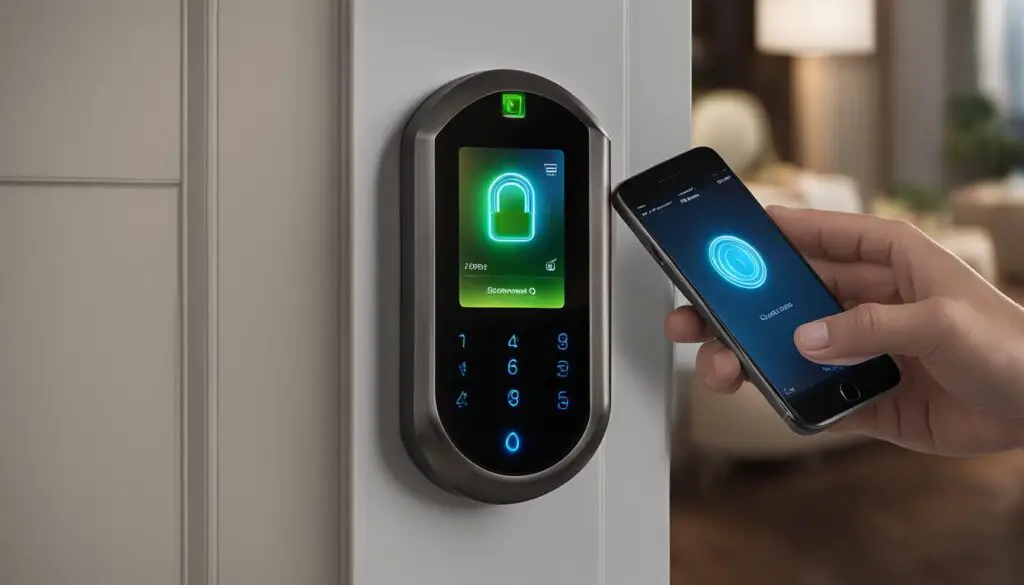
Benefits and Safety of Smart Locks
Smart locks offer numerous benefits that enhance both convenience and security for homeowners. With keyless entry, you can say goodbye to fumbling for keys or worrying about lost or stolen copies. Instead, you can unlock your door with a simple tap on your smartphone. This feature is especially handy when your hands are full or when you need to grant entry to someone while you’re away.
One of the key advantages of smart locks is their ability to provide guest access. Through a user-friendly app, you can easily manage temporary, recurring, or permanent access codes for friends, family, or service providers. This eliminates the need to share physical keys and allows you to remotely control who has access to your home. Additionally, smart locks offer activity logs that provide detailed information about door activity, giving you peace of mind and the ability to monitor who is entering and exiting your home.
By integrating smart locks into your smart home ecosystem, you can further enhance the security and convenience of your home. With seamless integration, you can automate your locks to lock and unlock based on specific triggers or schedules. For example, you can set your smart lock to automatically lock the door when you leave the house or unlock it when you arrive home based on your smartphone’s proximity. This eliminates the need to manually lock the door and ensures your home is always secure.
In terms of safety, smart locks are designed with robust security features. Encryption technology and two-factor authentication for app login provide an additional layer of protection against unauthorized access. Furthermore, smart locks are typically more resistant to picking or bumping than traditional locks, making them a more secure option for your home. By following best practices such as using strong passwords and keeping the lock’s software up to date, you can mitigate the risk of hacking and ensure the continued safety of your smart lock.
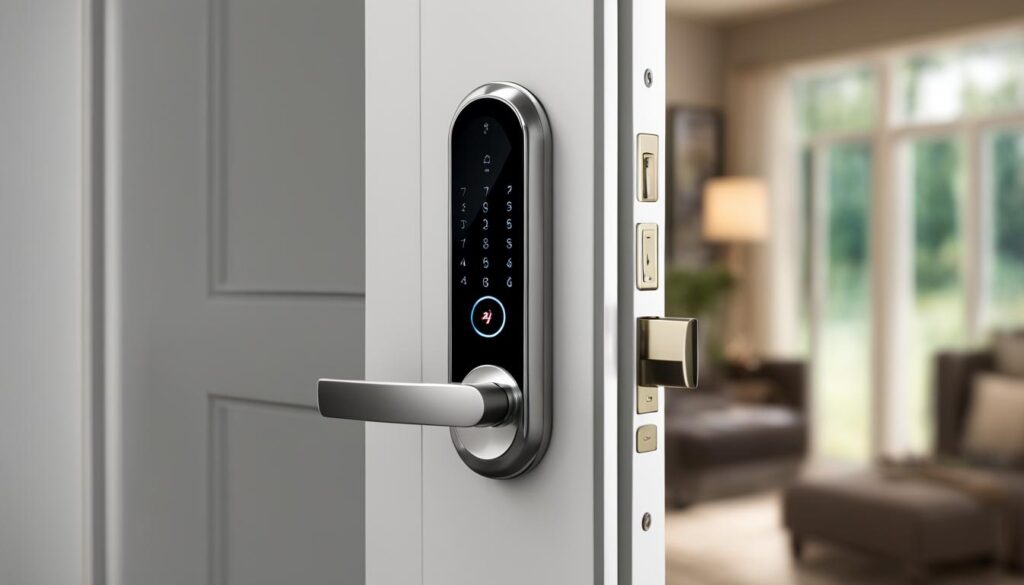
Benefits of Smart Locks
- Keyless entry and remote control
- Convenient guest access management
- Detailed activity logs for monitoring door activity
- Integration with smart home devices for enhanced security and automation
Safety Features of Smart Locks
- Encryption technology for secure communication
- Two-factor authentication for app login
- Resistance to picking and bumping
In summary, smart locks provide the convenience of keyless entry, guest access management, and activity logs, while also prioritizing safety through advanced security features. By integrating smart locks into your smart home setup, you can further enhance security and automate your home’s access points. With proper installation, maintenance, and adherence to online security measures, smart locks offer a reliable and secure solution for improved residential security.
Conclusion
Smart locks offer a convenient and secure solution for home access and security. With keyless entry, auto-locking features, guest access management, and activity logs, they provide enhanced residential security and peace of mind.
Compared to traditional deadlocks, smart locks offer several benefits, including improved residential security and control over access. They eliminate the need for physical keys, reducing the risk of spare keys falling into the wrong hands. With encryption technology and authentication measures, smart locks prioritize safety and are designed to protect your home.
When considering smart locks, it’s essential to choose the type that suits your needs, such as wireless smart locks, keyless entry systems, or digital door locks. Evaluate the advantages and disadvantages of each type and consider their compatibility with other smart home devices.
By properly installing, maintaining, and following online security practices, smart locks can provide a secure and convenient solution for accessing and monitoring your home. Enjoy the benefits of improved residential security with smart locks and experience the peace of mind they bring to your daily life.
FAQ
Are smart locks as safe as traditional locks?
Yes, smart locks are as safe, if not safer, than traditional locks. They use encryption technology and authentication measures to ensure the security of your home.
What advantages do smart locks offer?
Smart locks provide keyless entry, eliminating the need for physical keys. They also offer features such as guest access management, activity logs, and integration with other smart home devices.
How do smart locks work?
Smart locks can be operated through an app on your smartphone. They use Wi-Fi or Bluetooth technology to connect to your phone, allowing you to lock and unlock your door remotely.
Can smart locks be hacked?
While there is a minimal risk of hacking, it can be minimized by choosing smart locks from trustworthy manufacturers, using strong passwords, and keeping the lock’s software up to date.
What types of smart locks are available?
There are wireless smart locks that use Wi-Fi or Bluetooth, keyless entry systems with features such as fingerprint scanners, and digital door locks that replace traditional deadbolts.
Do smart locks require battery replacements?
Yes, smart locks require battery replacements periodically. The frequency depends on the specific lock and usage.
Is there a learning curve for using smart locks?
For those unfamiliar with technology, there may be a learning curve in setting up and using smart locks. However, most smart locks come with user-friendly apps and instructions.
Can smart locks be integrated with other smart home devices?
Yes, many smart locks can be integrated with other smart home devices, allowing you to control them through voice commands or automation systems.



